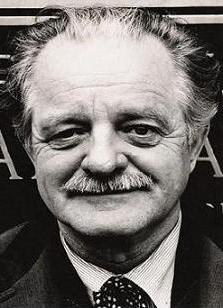Kenneth Rexroth facts for kids
Quick facts for kids
Kenneth Rexroth
|
|
|---|---|
 |
|
| Born | 22 December 1905 |
| Died | 6 June 1982 |
| Occupation | Poet, writer, translator, critic, musician |
| Spouse(s) | Andrée Rexroth |
| Awards | |
Kenneth Charles Marion Rexroth (1905–1982) was an important American poet, writer, and translator. He was a key figure in a group of artists and writers known as the San Francisco Renaissance. This movement helped shape new ideas in poetry and art.
Even though he didn't see himself as part of the Beat Generation poets, Time magazine called him the "Father of the Beats." He taught himself many things and learned several languages. This allowed him to translate poems from Chinese, French, Spanish, and Japanese.
Contents
Early Life and Adventures
Kenneth Rexroth was born in South Bend, Indiana. He lost both his parents when he was young. After that, he moved to Chicago to live with his aunt. He also studied at the Art Institute of Chicago.
When he was 19, he traveled across the country by hitchhiking. He took on many different jobs. For a while, he worked for the United States Forest Service. He helped build trails and cooked for crews in the Pacific Northwest.
Poetry and Influence
In the 1930s, Rexroth joined a group of poets called the Objectivists. They focused on clear, direct language in their poems. His work was featured in important poetry magazines and collections.
One famous story is about his book, The Love Poems of Marichiko. Rexroth said he had translated these poems from a young Japanese woman. Later, it was revealed that he had written them himself! People praised him for capturing feelings from a different culture and gender so well.
Rexroth was a mentor to many younger poets. He helped organize the famous Six Gallery reading in 1955. At this event, poets like Allen Ginsberg and Gary Snyder shared their work. This reading was a big moment for the Beat Generation. Rexroth even spoke in court to defend Lawrence Ferlinghetti for publishing Ginsberg's poem "Howl."
Years later, Rexroth became critical of the Beat movement. Still, Time magazine called him the "Father of the Beats." He even appeared as a character in Jack Kerouac's novel The Dharma Bums.
His Beliefs and Activism
When he was young, Rexroth was involved in the anarchist movement. This meant he believed in societies without strict government control. He also joined the IWW, a group that fought for workers' rights. He was a pacifist, meaning he was against war. During World War II, he refused to fight as a conscientious objector.
Later Years and Legacy
Kenneth Rexroth passed away in 1982 in Santa Barbara. In his final years, he focused on translating poems by women from Japan and China. He also worked to promote female poets around the world. The year before he died, he became a Roman Catholic.
Works by Kenneth Rexroth
- In What Hour? (1940)
- The Phoenix and the Tortoise (1944)
- The Art of Worldly Wisdom (1949)
- The Signature of All Things (1949)
- Beyond the Mountains: Four Plays in Verse (1951)
- The Dragon and the Unicorn (1952)
- Thou Shalt Not Kill: A Memorial for Dylan Thomas (1955)
- In Defense of the Earth (1956)
- Bird in the Bush: Obvious Essays (1959)
- Assays (1961) (essays)
- Natural Numbers: New and Selected Poems (1963)
- Classics Revisited (1964; 1986) (essays)
- Collected Shorter Poems (1966)
- An Autobiographical Novel (1966) (autobiography)
- Heart's Garden, The Garden's Heart (1967)
- Collected Longer Poems (1968)
- The Alternative Society: Essays from the Other World (1970)
- With Eye and Ear (1970)
- American Poetry in the Twentieth Century (1971) (essay)
- Sky, Sea, Birds, Trees, Earth, House, Beasts, Flowers (1971)
- The Elastic Retort: Essays in Literature and Ideas (1973)
- Communalism: From Its Origins to the Twentieth Century (1974) (non-fiction)
- New Poems (1974)
- The Silver Swan (1976)
- On Flower Wreath Hill (1976)
- The Love Poems of Marichiko (1978)
- The Morning Star (1979)
- Saucy Limericks & Christmas Cheer (1980)
- Between Two Wars: Selected Poems Written Before World War II (1982)
- Selected Poems (1984)
- World Outside the Window: Selected Essays (1987)
- More Classics Revisited (1989) (essays)
- An Autobiographical Novel (1964; expanded edition, 1991)
- Kenneth Rexroth & James Laughlin: Selected Letters (1991)
- Flower Wreath Hill: Later Poems (1991)
- Sacramental Acts: The Love Poems (1997)
- Swords That Shall Not Strike: Poems of Protest and Rebellion (1999)
- Complete Poems (2003)
- In the Sierra: Mountain Writings (2012) (poems and prose)
- K. Rexroth: World Poems #17 (2017) (poems and prose in Japanese translation)
Translations by Kenneth Rexroth
- Fourteen Poems by O. V. de L.-Milosz. (1952)
- 30 Spanish Poems of Love and Exile (1956)
- One Hundred Poems from the Japanese (1955)
- One Hundred Poems From the Chinese (1956)
- Poems from the Greek Anthology. (1962)
- Pierre Reverdy: Selected Poems (1969)
- Love and the Turning Year: One Hundred More Poems from the Chinese (1970)
- 100 Poems from the French (1972)
- Orchid Boat (1972) (with Ling Chung; also Women Poets of China)
- 100 More Poems from the Japanese (1976)
- The Burning Heart (1977) (with Ikuko Atsumi; also Women Poets of Japan)
- Complete Poems of Li Ch'ing-Chao. (1979)
Recordings
- Poetry Readings in the Cellar (with the Cellar Jazz Quintet): Kenneth Rexroth & Lawrence Ferlinghetti (1957)
- Rexroth: Poetry and Jazz at the Blackhawk (1958)
Images for kids
See also
 In Spanish: Kenneth Rexroth para niños
In Spanish: Kenneth Rexroth para niños


